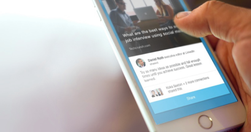Filter 572 resources:
- community (214)
- social media (109)
- comments (94)
- publicsphere (70)
- trust (68)
- media (64)
- news (60)
- participation (58)
- eu (56)
- troll (46)
- ocm (46)
- facebook (43)
- linkedin (41)
- engagement (39)
- disinformation (28)
- groupthink (28)
- blogging (24)
- event (24)
- ai (23)
- content strategy (20)
- psychology (19)
- multilingualism (19)
- democracy (18)
- bloggingportal (17)
- curation (17)
- web20 (17)
- science (16)
- journalism (16)
- medium (16)
- politics (15)
- bloggingportal2 (15)
- communications (15)
- filter bubble (15)
- ai4communities (14)
- crowdsourcing (14)
- bluesky (13)
- blog (13)
- identity (12)
- innovation (12)
- algorithm (12)
- atprotocol (12)
- fediverse (12)
- moderation (11)
- outreach (11)
- twitter (11)
- conversation (11)
- authenticity (11)
- bxlsbbl (10)
- trump (10)
- tool (10)
- europcom (10)
- conspiracy (10)
- storytelling (10)
- cofoe (9)
- science communication (9)
- design (9)
- k4p (9)
- promotion (9)
- us (9)
- english (7)
- cognitive (7)
- metrics (7)
- newsletter (7)
- covid19 (7)
- evidence-based policy (7)
- ec (7)
- collective intelligence (7)
- content (7)
- audience research (7)
- polarization (7)
- bot (7)
- knowledge management (7)
- privacy (6)
- social marketing (6)
- longform (6)
- euractiv (6)
- factchecking (6)
- eurosceptics (6)
- echo chamber (6)
- myhub (6)
- strategy (6)
- management (6)
- data (5)
- semantic (5)
- interactive (5)
- platform (5)
- video (5)
- ewrc2017 (5)
- open web (5)
- propaganda (5)
- web design (5)
- content marketing (5)
- ux (5)
- mastodon (5)
- marketing (5)
- regulation (5)
- influence (5)
- newsroom (5)
- information architecture (5)
- coral (5)
- tribe (5)
- brexit (4)
- google (4)
- drupal (4)
- blogger (4)
- russia (4)
- decentralised (4)
- ep (4)
- brussels bubble (4)
- open source (4)
- audiovisual (4)
- employee engagement (4)
- advertising (4)
- gender (4)
- enewsletter (4)
- usa (4)
- machine translation (4)
- themes (4)
- transparency (4)
- policy (4)
- wikipedia (4)
- attentionweb (3)
- instagram (3)
- qanon (3)
- bullshit (3)
- euroblog (3)
- collaboration (3)
- data journalism (3)
- chatgpt (3)
- podcast (3)
- llm (3)
- pr (3)
- atproto adoption (3)
- blogactiv (3)
- nytimes (3)
- vandenbrande (3)
- realtime (3)
- conference (3)
- game (3)
- internal communications (3)
- culture (3)
- post-truth (3)
- campaign (3)
- censorship (3)
- discourse (3)
- egovernment (3)
- atprotocol lexicon (3)
- search (3)
- native advertising (3)
- science journalism (3)
- hoax (3)
- lobby (3)
- semanticweb (3)
- signal2noise (3)
- mobocracy (2)
- productivity (2)
- blockchain (2)
- digital transformation (2)
- persuasion (2)
- project management (2)
- startup (2)
- reddit (2)
- backfire effect (2)
- nlp (2)
- consultation (2)
- organisation (2)
- business model (2)
- leadership (2)
- guide (2)
- free speech (2)
- augmented reality (2)
- design thinking (2)
- spambot (2)
- optimisation (2)
- debunk (2)
- chat (2)
- hr (2)
- hate (2)
- partisan (2)
- tumblr (2)
- local (2)
- climate (2)
- stream (2)
- online architecture (2)
- fascism (2)
- multimedia (2)
- slack (2)
- copyright (2)
- ft (2)
- mooc (2)
- dao (2)
- smartcities (2)
- future (2)
- europe (2)
- seo (2)
- editorial (2)
- eurosceptic (2)
- river4 (2)
- wiki (2)
- web (2)
- networking (2)
- australia (2)
- europa (2)
- roi (2)
- eci (2)
- survey (2)
- theme (2)
- portal (2)
- expert (2)
- livefyre (2)
- screencast (2)
- governance (2)
- gawker (2)
- eurocrap (2)
- letters2eu (2)
- co-creation (2)
- credibility (2)
- ltinnovate2016 (2)
- indieweb (2)
- substack (2)
- deep fake (2)
- research (2)
- lobbying (2)
- dissonance (2)
- us2020 (2)
- cozyweb (2)
- blogtour (2)
- tools (2)
- euractiv-com (2)
- eparticipation (2)
- learning (2)
- khub (2)
- syndicated-translation (2)
- comment (2)
- canonical debate lab (2)
- threads (2)
- robert putnam (2)
- idpi (2)
- model collapse (2)
- ruben verborgh (2)
- blacksky (2)
- eurosky (2)
- sovereignty (2)
- diig (1)
- hyperknowledge (1)
- massive.wiki (1)
- referendum (1)
- harvest (1)
- monetisation (1)
- cmv (1)
- motivated (1)
- pitch (1)
- spain (1)
- obama (1)
- web development (1)
- email (1)
- twitter migration (1)
- top3pods (1)
- support (1)
- github (1)
- training (1)
- opengov (1)
- digital garden (1)
- dark forest web (1)
- indignation (1)
- data union (1)
- slidecast (1)
- seenthis (1)
- meeting (1)
- egov (1)
- digg (1)
- #ilooklikeanengineer (1)
- disco (1)
- klout (1)
- ssi (1)
- network (1)
- society (1)
- b2b4me (1)
- gdpr (1)
- nasa (1)
- election (1)
- crowdfunding (1)
- logistics (1)
- bloom (1)
- game theory (1)
- technology (1)
- traffic (1)
- agent (1)
- energy (1)
- quit (1)
- responsive (1)
- douglas rushkoff (1)
- photography (1)
- hive (1)
- liveblogging (1)
- corporate journalism (1)
- antiviral (1)
- isismediablackout (1)
- surveillance (1)
- google+ (1)
- experiment (1)
- author (1)
- content partnership (1)
- sensecraft (1)
- big data (1)
- software (1)
- jeff jarvis (1)
- evolution (1)
- free our feeds (1)
- happeningo (1)
- calendar (1)
- anonymity (1)
- joan westenberg (1)
- forum (1)
- ecas (1)
- register (1)
- gpt-4o (1)
- listen (1)
- civil rights (1)
- right (1)
- synthesise (1)
- values (1)
- consultancy (1)
- geo (1)
- faceted search (1)
- nfc (1)
- internet of things (1)
- ibeacon (1)
- convert (1)
- cro (1)
- bbc (1)
- anuj ahooja (1)
- twxplorer (1)
- votewatch (1)
- mep (1)
- profile (1)
- new public (1)
- belgium (1)
- web2.0 (1)
- video_conferencing (1)
- interface (1)
- pluriverse (1)
- ethics (1)
- wikitribune (1)
- risk (1)
- knowledge panel (1)
- cultural exchange (1)
- sentiment analysis (1)
- meme (1)
- vlog (1)
- osmo (1)
- vsop (1)
- learn (1)
- pubhub (1)
- hangout (1)
- ugc (1)
- debatehub (1)
- ep2014 (1)
- stanbol (1)
- apache (1)
- rebut (1)
- meps (1)
- prezi (1)
- epale (1)
- opencalais (1)
- programme (1)
- education (1)
- scale (1)
- pilot (1)
- groupfeel (1)
- eesc (1)
- at4democracy (1)
- nhscitizen (1)
- conform (1)
- eu09vs19 (1)
- evidence (1)
- sortition (1)
- machine learning (1)
- popvox (1)
- micro.blog (1)
- posse (1)
- instant articles (1)
- public affairs (1)
- viral (1)
- interoperability (1)
- presseurop (1)
- geofence (1)
- computational propaganda (1)
- eu2024 (1)
- newsguard (1)
- pluralistic ignorance (1)
- robin berjon (1)
- machine text (1)
- infowar (1)
- apocalypse (1)
- geoengineer (1)
- nz (1)
- grassroots (1)
- wikinews (1)
- antivaxxer (1)
- cocomo (1)
- inscrutable (1)
- rail (1)
- talia stroud (1)
- bundle (1)
- inclusion (1)
- zettelkasten (1)
- infopocalypse (1)
- goodwill (1)
- cancel culture (1)
- eli pariser (1)
- gpt-x (1)
- unreality (1)
- bias (1)
- consent (1)
- stack overflow (1)
- activitypub (1)
- framework (1)
- media literacy (1)
- participatory culture (1)
- solid (1)
- adversarial interoperability (1)
- gab (1)
- blocklist (1)
- planetary (1)
- scuttlebutt (1)
- trust net (1)
- clubhouse (1)
- arg (1)
- floc (1)
- standards (1)
- w3c (1)
- presidency (1)
- dunbar (1)
- creativity (1)
- cambridge analytica (1)
- deletefacebook (1)
- launch (1)
- bluesky custom feeds (1)
- reflections (1)
- eu-treaty-institutions (1)
- eu-priorities-and-opinion (1)
- network effect (1)
- social-media (1)
- publicsectorinformation (1)
- cluetrain (1)
- addiction (1)
- programmes (1)
- information (1)
- rebuttal (1)
- ngo (1)
- truth (1)
- minimalist (1)
- lisp (1)
- yellow-card (1)
- eurosplinternet (1)
- whitewind (1)
- brand (1)
- life-in-belgium (1)
- hungarian (1)
- accreditation (1)
- bryan newbold (1)
- altmetric (1)
- integrate (1)
- open social (1)
- collaborate (1)
- explainer (1)
- virtual reality (1)
- justice-home-affairs (1)
- purity spiral (1)
- nft (1)
- ostrom (1)
- cooperatives (1)
- snapshot (1)
- multisig (1)
- d2d (1)
- knowledge graph (1)
- note (1)
- subconscious (1)
- fotl (1)
- betaworx (1)
- conference report (1)
- gordon brander (1)
- customer support (1)
- law (1)
- milo (1)
- open data (1)
- facebook live (1)
- resilience (1)
- visual (1)
- ideation (1)
- network theory (1)
- edelman (1)
- uk (1)
- crm (1)
- livestream (1)
- clickbait (1)
- sceptic (1)
- pattern language (1)
- religion (1)
- transmedia (1)
- snowfall (1)
- sponsored content (1)
- disruption (1)
- social capital (1)
- paywall (1)
- wisdom (1)
- referrals (1)
- scrollytelling (1)
- magazine (1)
- prototype (1)
- amp (1)
- cor (1)
- city (1)
- plexus (1)
- intimacy (1)
- region (1)
- analytics (1)
- 360video (1)
- ambassador (1)
- newsfeed (1)
- data visualisation (1)
- persona (1)
- cms (1)
- publishing (1)
- filter (1)
- jelly (1)
- data enrichment (1)
- perception (1)
- tourism (1)
- youth (1)
- medicine (1)
- mike masnick (1)
- airbnb (1)
- gtd (1)
- counter speech (1)
- intranet (1)
- messaging (1)
- ma parent (1)
- membership (1)
- vine (1)
- radio (1)
Relevant Overviews
- Communication Strategy
- Content Strategy
- Online Strategy
- Online Community Management
- Social Media Strategy
- Content Creation & Marketing
- Digital Transformation
- Change & Project Management
- Innovation Strategy
- Communications Tactics
- Psychology
- Social Web
- Media
- Politics
- Communications Strategy
- Science&Technology
- Business
Overview: Online Community Management
Convening a community can be the most powerful communication tactic there is.
Online communities offer enormous opportunities to the right organisation. Community members are far more likely to read your content, think of your organisation, give you feedback, share your content, attend your events, get involved in your programmes, and buy your products.
On the other hand, convening a community is hard: few people have time for more than a couple of online platforms in their lives, so attracting them to yours means you need to be uniquely useful to them.
That generally requires a change of mindset and new internal processes across the organisation, because it’s not your community - it's theirs. And getting their involvement means really listening to what they have to say, and then visibly acting on it.
I built the EU Commission’s first online community in 2002, and have built many more successful ones since. If you’d like to chat, get in touch.
More services: start with Communication strategy.
Relevant resources

"Networks are pretty good for collisions. Bureaucracies are pretty bad for collisions." - Why I Write on Medium — The Message — Medium

"The Influencer Identification Worksheet is a blogger outreach brainstorming tool [to] build a list of bloggers." - A 4-Step Blogger Outreach Tool for Identifying Influencers | Convince and Convert: Social Media Strategy and Content Marketing Strategy

From a nondescript office building in St. Petersburg, Russia, an army of well-paid “trolls” has tried to wreak havoc all around the Internet — and in real-life American communities.
“In fact, the very point was to get them, and these comments, off my pages,” - After deciding to charge for comments, Tablet’s conversation moves…to Facebook » Nieman Journalism Lab

I need three speakers for a EuropCom2015 workshop to share their thoughts on convening and managing communities in the context of public communications and policymaking. The following throwaway remark on Linkedin landed me with the task of setting up a workshop at EuropCom 2015:"I'd suggest combining "Setting-up and managing online …
I quite enjoyed the experience of reposting to Medium, and really like how Medium is evolving as a platform, particularly how they are… … re-imagining comments with Highlight, Comment & Respond… these three interactive features echo the ‘nibble, bite, meal’ content model, but in the other direction, from you back to the community. - The Nibbl…
LinkedIn generated the highest visitor-to-lead conversion rates compared to Facebook and Twitter, where leads were almost three times higher to convert than Facebook or Twitter. To perform this analysis, we collected one of the largest datasets of top performing long-form content across the LinkedIn Pulse network. This is what we found.... .…

An array of sophisticated language technologies could help ideas flow across EU borders, link national conversations together and support the EU Online Public Sphere - the demos the EU needs. But BloggingPortal is unlikely to feature them. [update (17/5/15): I finally decided to kick Medium's tyres by reposting this there, with less history. …

"... suggests articles to its users ... and then lets users schedule and share those links across LinkedIn and Twitter... [aimed at] marketing professionals... with story suggestions letting them stay active even when they have no links of their own to share, and analytics ... create specific topic areas to track ... also coopting a company’s la…

One of those projects you feel privileged to work on. It’s not often you get to experiment with crowdsourcing, augmented reality, faceted search and commemorating US war dead in one project.

"Startups are notorious for this: You’ll have two or three people who are true hustlers, wearing multiple hats, pushing themselves and others to get shit done, while the rest of the group sort of ‘tags along’ and waits for shit to happen. " - The Truth About Collaboration — Medium

Comment moderation and online community management strategies for news organisations, but relevant to government sites too: "Comments are a way for readers to connect with one another, and with the journalists and editors reporting the news. But ... can quickly turn uncivil, and news organizations often don’t have the resources or manpower to con…
Good case study, concluding with observations on the role of journalists which also apply to government communicators: "An engaged journalist's role in the 21st century is not only to inform but to bring readers directly into the conversation through... real-time coverage, alternative story forms, crowdsourcing, beat blogging, user-generated co…

"What was originally intended to be a simple and user-friendly tool for all EU citizens has turned out to be cumbersome and challenging in its use... Stakeholders have come up with concrete recommendations on how to adjust the instrument... first report on the application of the ECI Regulation by 1 April 2015 ... the first step towards a revision…

A whole load of recommnendations for the UK's House of Commons, including some intriguing ones - eg: "We believe the public want the opportunity to have their say in House of Commons debates; we also believe that this will provide a useful resource for MPs and help to enhance those debates. We therefore recommend a unique experiment: the use of…

"Crowdsourcing is not about work. Crowdsourcing is about community. Without a solid community, you get not-solid results from your crowdsourcing endeavor.... The goal of many of these tactics is not to stop assholes from being assholes, just to slow them down and demotivate them from destroying your community." - Crowdsourcing isn’t broken — Bac…

"While we've always loved a good chart and map at Vox, appreciating a chart or map does not data journalism make. Data journalism is not just data visualization... ... the explosion in data sources readily available on the web... can both aid in telling important and necessary stories, but can also be easily misunderstood and potentially manipula…

" online comments can be worth having, if the publisher puts the work in." Excellent case study. Found this stat particularly interesting: "Users who log in, which is required if you want to comment, view seven pages per session on average, while non-registered users make it to only 1.7" I'd suggest that users who both view 4 times as much conte…

"Guardian digital editor Aron Pilhofer say killing off comments is a “monumental mistake.”... ... many traditional newsrooms are failing to take full advantage of the web’s ability to create a two-way relationship with readers, and that this is a crucial element of what journalism has become in a digital age... ... "You see site after site movin…

"Q. Is it realistic to think that a European public sphere could ever be created? TGA: My view is that we should try, but we shouldn’t ever kid ourselves that this is going to be like a national public sphere. Apart from anything else, we speak different languages, which is a huge barrier. The key for me, in continuing to make the argument for …

"handing over a key component of your relationship with readers to Twitter and Facebook is a mistake... suggests to readers that their comments and interaction aren’t worth the trouble" [If] "Comments are broken ... that’s not the fault of readers — it’s the fault of publishers for not seeing their relationship with their readers as being of valu…

Interesting research: "Seventy different political posts were randomly either left to their own wild devices, engaged by an unidentified staffer from the station, or engaged by a prominent political reporter. When the reporter showed up, “incivility decreased by 17 percent and people were 15 percent more likely to use evidence in their comments on…
"With Hive, a developer can create assignments for users, define what they need to do, and keep track of their progress in helping to solve problems. " - The New York Times R&D Lab releases Hive, an open-source crowdsourcing tool » Nieman Journalism Lab

Is primetime TV advertising the right way to connect citizens to the EU?

"The report uncovered an uncomfortable truth: that there are few civic society organisations that are capable of participating in shaping the national positions at a stage when the European Commission has already come up with a draft.... it is usually a challenge to find a list of EU issues where the national government is elaborating its nati…

How do we want to communicate with each other? ... what kind of communicator would we actually want to use?... How do you signal that you're available to talk about movies, but not to talk about work? As we talk to more people more of the time, we'll also need smarter status indicators and smarter ways to break down conversations. The closest t…

"Every new platform that relies on user generated content depends on influential users who make the platform indispensable, thereby attracting larger numbers of users to try it out. But it's a Catch 22; the platform needs the influencers to make it indispensable, but these users won't become addicted unless it's already indispensable" Same 'vic…
Good overview of the year+ - long debate about comments, trolls & social media, "from the baby-and-the-bathwater dept ... This sudden disdain for traditional comments raises the question: is Facebook somehow immune to stupid comments? Is forcing all news conversation on to Facebook's terms really an improvement in meaningful dialogue?... It's lik…

Interesting reaction to Reuters, who argued "Much of the well-informed and articulate discussion around news... has moved to social media and online forums... But is that enough justification for giving up comments? ... not everyone is on Twitter, and not everyone is on Facebook, and so any conversation or interaction that occurs there will be in…
Loading more...
Relevant Overviews
- Communication Strategy
- Content Strategy
- Online Strategy
- Online Community Management
- Social Media Strategy
- Content Creation & Marketing
- Digital Transformation
- Change & Project Management
- Innovation Strategy
- Communications Tactics
- Psychology
- Social Web
- Media
- Politics
- Communications Strategy
- Science&Technology
- Business
